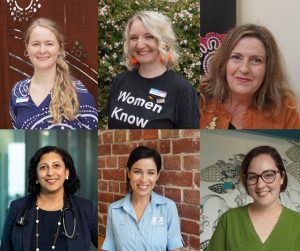Central Adelaide Local Health Network is committed to ending violence against women.
As one of the largest health agencies in South Australia, CALHN has a responsibility to ensure we are doing our part in creating a safe environment, free from all forms of violence and disrespect – regardless of gender.
Evidence shows overwhelmingly that women experience domestic and family violence at higher rates than men, impacting their safety, wellbeing, attendance and performance at work.
We can reduce violence against women in Australia by increasing gender equality in every aspect of our lives. Read about what some of our staff here at CALHN think can be done to stop violence against women.
Nicholas (Nurse Educator)
Every day we can call out comments, conversations or actions that belittle women and take these as opportunities to educate others to why this behaviour is not appropriate. Helping others to understand the link between such behaviour and an unconscious perception that violence against women is acceptable is paramount to ending violence against women.
Our communities need increased promotion and creation of flexible working arrangements. These flexible arrangements need to allow for adaption of a role including its working hours to facilitate family and personal needs. We should celebrate and offer greater support, benefits, and options for parental and family leave as this will promote more equal responsibility and role sharing in families.
Amanda (Executive Director Nursing Workforce and Patient Experience)
We need to understand that physical violence against a woman starts from verbal abuse. Verbal abuse starts with disrespectful comments and behaviours. My view is that to end violence against woman we must ‘call out’ and stop disrespectful comments and behaviours. For example, we should stop sexist jokes, including using ‘like a girl’ as an insult and stereotyping that ‘boys don’t cry’, to name but a few. To call out sexism we need to ensure we know and can recognise sexism (including of disrespect and harassment).
From a community perspective we need more education and training. We need to include woman at all levels of hierarchy across all industries; and promote flexible family life to ensure we have diversity of thinking across the job sector and that the next generation are supported to flourish through nourished family life. We need to talk about ‘glass ceilings’ in all forums and we need to celebrate the success and shift/weakening of the ‘glass ceiling’. Lastly we need to continue the conversation with, ‘so what next, where to from here’.
Ishita (Consultant Geriatrician)
Abuse does not always stem from a perpetrator deliberately wanting to harm. Gender stereotypical roles are so well engrained in our society that for generations women have accepted violence against them as a normal part of societal construct and that it is how men express themselves. While there is now greater recognition of violence against women as a problem, we as a society have a long way to go to ensure women understand it is unacceptable and feel empowered to raise their voice against it.
We need education starting with school level children in order to break these stereotypes and also increase awareness amongst women of how they can approach a situation of violence against them right from the first time it happens.
For as long as gender stereotyping exists in our society, Gender inequality will prevail. In order to address gender equality each individual needs to initiate a small change in how they think, perceive and advocate against gender roles. It needs shift in social mindset such that subtle messaging of gender stereotypes can stop as well as structural changes such that opportunities for education, jobs and progress are not specific to men or women. Until such time that concepts of motherhood penalty and men not being recognized as carers exist, it is hard for us to experience true gender equality.
Sarah (Director Social Work)
The examples we set for children and young people in our lives shape the way they think about gender, respect and who they are in the world. Encourage a culture of acceptance by starting conversations about gender roles and challenge the traditional features, clothing and characteristics ‘assigned’ to women and men.
We need male allies to call out other men when they say something, tell a sexist joke, or act in ways that disrespect women. It’s not about being a superhero – it’s about making it clear you don’t tolerate sexism or misogyny.
Gerry (Executive Director Medical Services)
Every day we can pay attention to unplanned absences from important work-related or social events and ask the question of yourself rather than assuming the reason is a sick child or family member. At work we should be checking in regularly with female colleagues and be available and open to assisting at short notice
At work we need intentional professional development pathways which address barriers to achievement – designed by women for women and accepted by men

Jai (Nurse Lead, Neuroscience and Rehabilitation)
Teach your next generation – We focus so much on empowering women and enabling them to be a strong voice. It is important to have equalling focus on boys or men around us. Start at an early age to teach young ones especially boys about consent, listening to the other gender, learning about signs of abuse, speaking up not just for yourself but for others as well. Display these behaviours in your everyday living. Teach your younger generation about it is OK to be scared to speak up; however, you should always SPEAK UP EVEN WHEN YOUR VOICE IS SHAKING.
Coming from a different cultural background and having insight into cultural practices – I still see lot of gender-based tasks in community. It is vital to confront gender stereotyping by popular members of the community and news media. Traditional gender roles for home duties, bread winner for the family and housewife or house-dad etc. need immense focus. Changing socialisation practices that are gender based in community will gradually increase public consciousness on the topic.
Mel (Program Director, Mental Health)
Violence against women is widely recognised as a violation of human rights and a public health problem. Violence against women is also a prominent public mental health problem in which mental health professionals play a key role in identifying, preventing, and responding to violence against women more effectively.
A critical component of ending violence against women is to first understand the issue. Our attitudes are an essential factor in the understanding and ending men’s violence against women, this is because our social and cultural norms and are an indicator of the way in which we think about and engage with issues of violence. I would say if we bring this into our mindset about how we experience our values and attitudes in this space we can engage with this issue in a way that promotes care, support and understanding. Violence against women starts and ends with us all.
Gender inequality is an aspect of all inequality and references a social construction of gender. For me, as a mother of two daughters we talk about gender and what this means in the world for who you are and how you identify. It is important that all genders have equal rights, responsibilities, and opportunities. I think importantly research tells us that gender equality assists to prevent the occurrence of violence.
Lucy (Diversity and Inclusion Officer)
Violence is rooted in gender inequality. The small things we allow – jokes, stereotypes, put downs – send a message that women are less important. Challenging sexism and misogyny, but also other discrimination, is crucial to changing the culture that will eventually lead to a reduction in violence. More men and people in positions of power need to speak up against sexism and unfairness and use their privilege to fight for others.
We also need more funding for women’s services and those servicing marginalised communities. We need much more funding and roll out of preventative programs, including consistent school education about gender inequality, stereotypes and discrimination.
Craig (Interim Nurse Director Outpatients)
Modelling respectful and indiscriminate behaviours throughout all interactions, within the workplace or community, is an encouraging way for people to feel safe and confident. Every action has consequences, and I believe that people should think before they act no matter what race, gender, culture, or title they hold. All genders should have equal opportunity and feel safe in their home, workplace, or society. Whilst such thinking is a shared philosophy within our LHN, I am mindful to also ensure that I keep abreast of contemporary social issues and apply new learnings as they arise.
Violence against women is one part of a broader social issue, and ensuring my own good conduct and professionalism is one way to demonstrate my personal standards and tolerances. Ending violence against women requires a consistent and multi-level approach, and by modelling good behaviours, calling out misbehaviours, and being available to support my colleagues and appreciate everyday good conduct.
I think we need more kindness and less focus on a one-size-fits-all solution for social issues, so we have the chance to participate in a dialogue that respects the dynamics of individual pressures and needs. We need to strengthen pay equalities and transparency throughout the community, and promote a culture that is guided by mutual respect and a sense of accountability. We are lucky to live and work in safe, progressive, and considerate environment and we need to keep working together to improve education for the empowerment of human rights.




